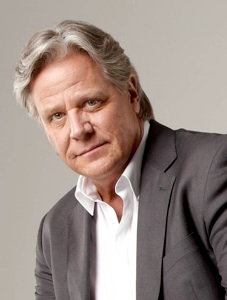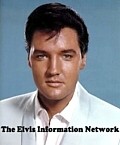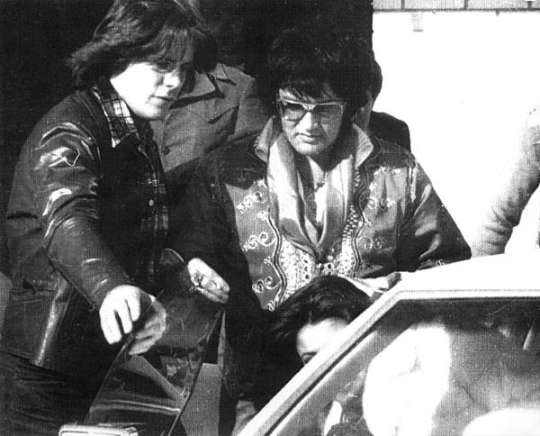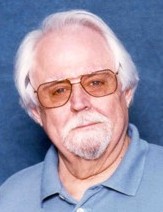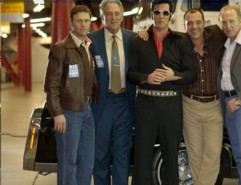Interview:
David Stanley talks to EIN |
Telephone interview conducted by Nigel Patterson and David Stanley on 24 May 2012
Comment on this interview
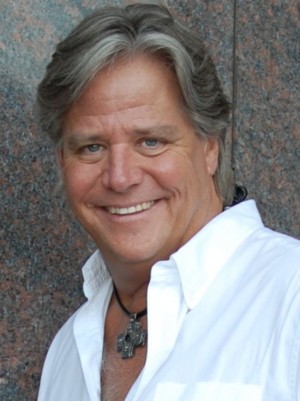 |
About David E. Stanley
David E. Stanley was born in Newport News, Virginia in 1955 to Bill and Dee Stanley. Three years later his parents divorced, setting the stage for an extraordinary event. In 1960, Dee Stanley married Vernon Presley, Elvis Presley’s widowed father.
David was just four years old, 20 years younger than his new stepbrother when he moved into the Graceland Mansion. Through a strange twist of fate, Elvis Presley had become David’s big brother.
David spent the next 17 years growing up with Elvis Presley and became the young apprentice to an Elvis few knew - Elvis the mystic and healer.
On August 16, 1977, David was among the first to find the lifeless body of Elvis---the man who had been his brother, friend, mentor and surrogate father.
Today David Stanley is a bestselling author and speaker in the field of self-development. He is the co-author of the New York Times Bestseller, “Elvis We Love You Tender” and author of “Raised on Rock” and “The Elvis Encyclopedia”.
David's latest book, Conversations with the King Journals of a Young Apprentice, was released in May 2012. |
EIN: David, it is great to talk with you again. It’s been a long time since we last spoke.
DS: It’s great to talk to you again, Nigel. How long has it been, 5 or 6 years?
EIN: Yes, I think 2006 was the last time, so 6 years. In that time a lot has happened in your life. You have remarried and this month you have released your latest book, Conversations with the King Journals of a Young Apprentice. Before we talk about your new book tell us why you are in, today, in Las Vegas.
DS: I’m at a conference I regularly attend. It’s called CEO Space. It is held five times a year and I’ve been coming to it for around 10 years now. CEO Space is essentially a gathering of business associates and people who come with new ideas and concepts. It’s like a Think Tank for business people. It’s all about achieving your goals more quickly, about new ideas and concepts and learning more about business funding and business structure. I have found CEO Space to be a great opportunity to interact with many successful entrepreneurs, businessmen and key influencers and move closer to or reinforce my own success.
In fact, it is where I came up with the formal ideas for Conversations with the King. I’d had the idea in my mind for a long time that I would one day do a book about the spiritual side of Elvis and I got together with a group of my friends at CEO Space and asked them what they thought. With their ideas I came up with the form and structure for and key messages I wanted to communicate through the book.
Watch David Stanley on CEO Space
EIN: And your new marriage. Please tell us about Katy*.
DS: Katy and I met a couple of years ago right here at the CEO Space Conference. Katy is the best thing to have come out of my visits here. We have a lot in common and we fell in love. We married in October 2011. We have a wonderful relationship; Katy is a very smart and beautiful woman and I’m blessed to have her in my life.
EIN: Congratulations on your new book, Conversations with the King Journals of a Young Apprentice. It is a very different release to your earlier books. Please tell us how it came about.
DS: Obviously I knew the spiritual side of Elvis as I grew up around him. Larry Geller who I regard as Elvis’ spiritual mentor did too. I had a fundamentalist Christian upbringing but it wasn’t until I grew older that I began to adapt to spiritual things as well. I am now 56 and I have grown up a lot over the years. About 6 or 7 years ago I thought that one day I would do a book about the spiritual lessons I had learnt from Elvis. I knew I wanted to look at who the real Elvis was and his influence on the millions of people he continues to touch 35 years after his death. Conversations with the King was always to be more than talking about Elvis the singer or Elvis the entertainer or the handsome person he was. The Elvis I wanted to write about and bring to people was the spiritually evolved Elvis. I wanted to write about him from that perspective.
So the people that read Conversations with the King aren’t going to get the high collars and the sideburns and the cute stories. What they will get Elvis the person in a very positive light. I talk about the struggles he dealt with and what is was like being Elvis, the iconic superstar that people look at and many see as all that he was. If they read Conversations with the King they will see even more of who he really was.
I know the book will not appeal to everyone; as you know, Nigel, it’s a self-help book, a progression from my program, which we’ve talked about in an earlier interview, Solutionary Dynamics: Solutions for Success. At times I do touch on Elvis’ dark side, but it is in the context of ‘if it could happen to Elvis, it could also happen to you’.
With Conversations with the King, we are stepping into the growth in my life through the great lessons I learnt from Elvis.
We know what happened to Elvis, we know what went wrong, but my book is really about the wonderful authentic things we can learn from Elvis; things we can recognise in our own lives and embody the greatness of our own true authentic selves from a personal perspective.
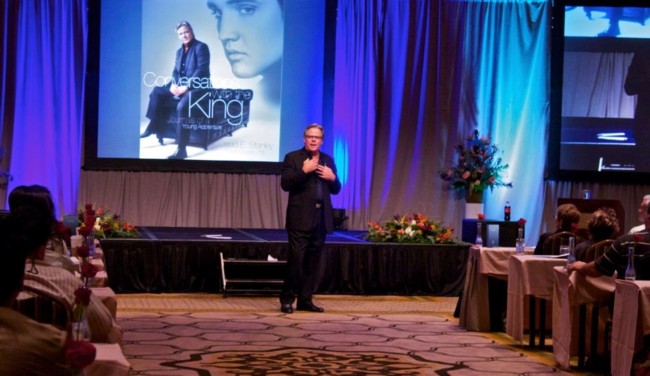
Conversations with the King is about the spiritual side of Elvis and my own spiritual search. Elvis was much more than just a religious person, he was a deeply spiritual one. Elvis’ search for spiritual enlightenment was a very important part of who he was as a person.
I started writing the book about 6 or 7 years ago. Its subject matter is one that while known by many fans, has not been widely written about. Elvis’ spiritual mentor, Larry Geller, has written about it and I wanted to add to people’s understanding of how important it was to Elvis and reflect some of the lessons he learned; some of the lessons I’ve learned. Elvis grew up in an environment of fundamental Christian dogma in the Pentecostal Church, but he was always seeking to learn more and understand more about his role in the world and why God had put him here.
Above all, I wanted to celebrate Elvis the positive things about Elvis and his life. The darker elements are well known and I had arrived at a time and place in my life where I wanted to focus on the good things and to communicate his messages to people.
I know that’s a long answer and I hope it makes sense.
EIN: Those familiar with your books and vocational experience will have seen the recurring themes in your adult life – a strong belief in God and a passion and a skill to communicate positive messages with others.
DS: You know Nigel, it’s now been 32 years that I’ve been on the road as a motivational speaker. I have openly talked about the temptations and downsides to growing up around Elvis as well as the journey of spiritual growth that it set me on. Throughout my days as a speaker, preacher to my program Solutionary Dynamics and where I am today, I have used Elvis as an example of how we can overcome adversity and through hard work and belief achieve success in our lives. While some people see it as a negative thing, it is a natural progression in life to take more out of life.
EIN: Elvis was much more than a religious person - he felt that he was hand picked by God?
DS: Oh yes, most definitely. There is a saying: ‘Be still and know that I am God’. Elvis took this literally. He knew he was chosen.
EIN: The subject matter will not appeal to some fans. What do you say to those who may be hesitating in buying Conversations with the King?
DS: I think all fans will get something out of Conversations with the King. I wanted to go beneath the public image of Elvis to really look at who he was as a person: his charisma, his spiritual search. I wanted to share with people more than just Elvis, the singer and Elvis the superstar. In the book I talk about what really made Elvis, Elvis; his struggles and what it was like being Elvis. One of the things I talk about in Conversations with the King is Elvis as Prophet. Elvis was a wonderful message communicator and he did this through his music. His music was in another sense his pulpit.
Elvis was a human being with an extreme gift which touched, and continues to touch, millions of people.
EIN: Please tell us what you mean by Elvis the Prophet.
DS: You know I had a conversation about this with Larry Geller when we caught up about two months ago. Elvis the Prophet or Elvis the Mystic, Elvis was always searching. Elvis was concerned about the future and where things were going. He recognised that the world had come a long way since the innocence of the 1950s. In the 1970s many things were outrageous. Elvis saw a future deterioration of society at all levels – in the establishment, greater incidence of marital and family breakdown, even a deterioration in music. He knew he couldn’t stop it but he wanted to be, and do good. As he travelled along this path I was his young apprentice.
from Conversations with the King Journals of a Young Apprentice:
Despite what I was experiencing in the Assembly of God and the gifts I'd seen in Elvis, in many of those churches there was still a judgmental, condemning approach to salvation. Nevertheless, the healings that I was part of in these churches challenged the beliefs I had acquired from my mother's denomination. Even though my faith increased as I witnessed the miracles of God in these churches, I was still very much in fear, so instilled in me were the dogmatic dos and dont's that contradicted the beliefs I had from my youth. |
EIN: And what about Elvis the Healer?
DS: Elvis grew up in a Pentecostal Church, the Assembly of God. They preach the teachings of Christ as most other denominations do, but the Pentecostal Church take the fact that Christ was the healer very literally. Elvis believed as Jesus said that you'll do these things and more long after I'm gone. Elvis grew up believing he had a gift from God, not only within the structure of his music, but also in his touch. Elvis was a praying man, a deeply spiritual person, not religious, but a deeply spiritual man and he believed the Bible when it said you can do these things and more. As an example, Elvis was the sort of person who would pray for you. If I ever had a headache or something else was hurting in my body or I was sick, Elvis would pray for me. One of his favorite sayings was from the book, The Impersonal Life, in fact it is the central theme of, and he would say:
"Be still and know that I am God"......and Elvis would add, "God touch David, through me and through the Lord I touch his wound, his pain", and God answered.
As a kid that was strange to me. As I grew older, and I say this in quote, used to be in Ministry - most people know that - I spoke at these kind of churches and I saw this first hand; not only from the pastors but also from the people who attended church - they truly believed you could pray and heal and through that prayer and through God's movement in that prayer that healings took place. Elvis took that literally. He just believed, like a child would believe, and acted on that belief. I realise that's very hard for people to understand.
Obviously Elvis was the King of Entertainment and the King of Rock and Roll, but he was also a human being with an extreme gift from God, and he had the touch of healing. Now he may never have ever touched any physically and they were healed, but through his music, going back to his music being the message, millions of lives have been touched, millions of hearts have been helped. Does that make sense?
EIN: Yes it does, thank you David. As we're discussing, the themes in your book are very powerful and can be hard to understand. A core theme of Conversations with the King is our 3 selfs or selves. Please tell us about these.
DS: All of us have 3 selfs.
These are the public image, the way others see or perceive us; the second self is our dark side, that part of us that does things we later regret, and the third self is our authentic self. That is the part of us that can be the hardest to see and in Elvis' case, was even more incredible than the iconic image his fans loved.
The challenge for Elvis, and sadly one that he was unable to overcome, was to put his dark side to rest and become unprisoned by his public image, his public iconic self.
As with all of us, except to a much greater degree because of his celebrity, there was a big gap between between Elvis' public self and his dark self and the consequence of this is that his authentic self became dimmer until it eventually was snuffed out.
If Elvis had been able to find a way to put his dark self to rest and become unprisoned by his public image, I really believe he would still be here with us today. |
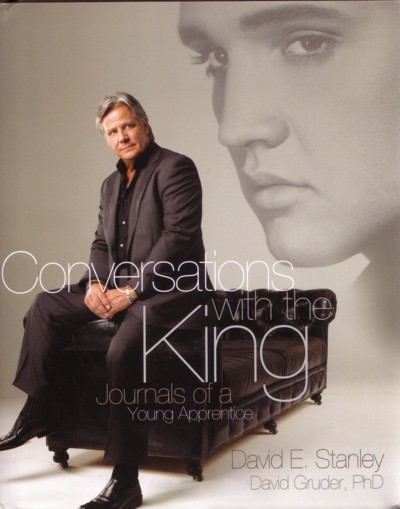 |
In Conversations with the King, a key concept is ‘Authenticity’. What do you mean by this?
DS: Authenticity to me is a gift. I am a spiritual person and I believe in God and that God has given all of us a gift. Elvis had that gift and he realised it was a gift from God and it was the authenticity that we saw in Elvis that drew us to him. Elvis’ gift was that wonderful voice, that powerful magnetism, that ability to communicate joy and to edify and lift our spirits.
And as we all know, Elvis never did anything in his music to tear down establishments; he was never involved in anything bad. He was always singing either gospel or love songs. He was always communicating a message. Sure, at times, we heard hurt in some of his songs, reflecting situations in his personal life. You know, Elvis’ stage was his pulpit, his audience was his congregation, and his music was his message. Again, this was the authentic Elvis, the authentic Elvis that also drives the Elvis Information Network and drives millions of people to love him every day. Looking at it in a different way, the authenticity and greatness of anyone is utilising our gifts from God, whatever they may be.
Elvis had a gift and that was Authenticity. You know most people see Elvis as a great singer with a wonderful voice and amazing magnetism. But he was able to be such a great communicator because he had Authenticity. And his communication was always positive, about love and caring.
How individual people look at icons icon be very different and is formed by particular triggers in their lives. If you think about Disneyland, people look at Mickey Mouse on the water tower and it creates different feelings and thoughts for different people. We look at and see what we want to see. With icons like Elvis and Michael Jackson we do the same. In so doing we can focus on the image and miss the real person.
In our own lives we often live in a state of deniability, an almost fishbowl existence where we rarely reveal our real self. Elvis could do this too and because of his advanced spiritual growth it caused a conflict within him because he had chosen to keep hidden from the world some of the most precious parts of his authentic spiritual self.
| |
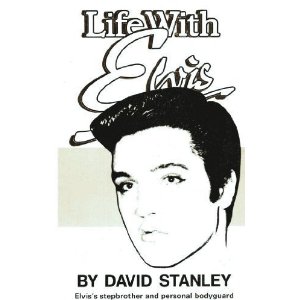 |
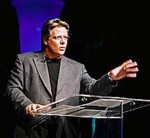
David addressing an audience in 2002
|
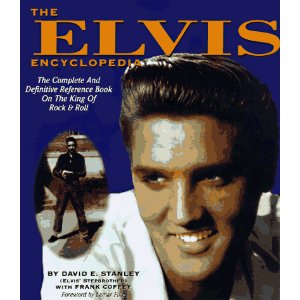 |
EIN: In Conversations with the King, there is a powerful statement, “Transparency is the essence of Authenticity”. Please explain what this means.
DS: Transparency is a complex issue. Essentially it means showing your heart. This can happen through doing good deeds, through showing you care about others. There is a goodness in all people and it is there for them to share with the world.
One of the things I talk about in the book is how Elvis is such an iconic superstar. By way of comparison, in the US we also have Disneyland and if you visit Disneyland you will see the image of Mickey Mouse on the water tower. Everybody who looks at that iconic image sees what they want to and sometimes they miss what is real.
I think Elvis became so big that many people could not see past his ‘image’. At times that was very difficult for him to deal. By looking at the image of Elvis as they did, many people lived or live in a state of deniability about some of the decisions Elvis made that caused us to lose him so young. You see living in a fishbowl existence of walking around projecting what you want everybody to see and not revealing the inner side of your authentic self is a dangerous thing that creates the situation of ‘image’ only.
As you have seen when reading Conversations with the King I am completely transparent about my life. I am disappointed in some of the things I’ve done in the past and the mistakes I've made.
As a young, troubled adult my dark side was often prominent and I said and did things I now regret. I talk about my mistakes, the things I regret, and the apologies I’ve made to people. This includes things I’ve said about my life with Elvis and the things I’ve regretted and wished I hadn’t said because of the damage they caused.
In being open and transparent in the book I am trying to help others. You know I grew up in such a non-transparent way. I guess I learnt that if I can show people who I’ve been, whether people like it or not, and who I really am (today), at least I can be honest with myself and live with myself.
So for me being transparent about who I am, including the mistakes I’ve made, is necessary for me to show my authenticity or authentic self.
Authenticity also means showing your heart and as I said before, utilising your gift from God. Anything good you do or that motivates you, any positive deeds, they are all an act of transparency reflecting one's authentic self. They let people know you are grateful, giving and caring. I believe that in all people there is a part which is about goodness, which is authentic, and which needs to be shared with the world. I know that’s another long and quite complex answer but I hope your readers can see what I mean.
In recent years I have done what I can to apologise directly to those I feel I may have hurt or offended. One of the people we have lost in the Elvis world is Patti Parry. I was at Patti’s funeral and also there were Priscilla and Jerry Schilling who I hadn’t seen for a long time. I have a lot of regret about some things. For this reason I apologised directly to Priscilla. I didn’t have to but I did. I went up to Jerry and said hello and gave him a hug.
Despite the reason for our getting together, it was a wonderful time catching up with old friends, friends who had shared an incredible, unique and irreplaceable experience being around Elvis.
In getting to the stage where I could write Conversations with the King I had to go through a stage of being sorry for things I’d done and growing as a person. What I’ve written in the book comes from the bottom of my heart.
DS: Meditation really started for Elvis when he visited a female Yogi in Los Angeles. Elvis was highly strung and he found a calmness and insight through meditation. Elvis was a very visual person so he took to meditation very quickly. He understood the law of attraction and was very grateful for the things God had given him. Elvis saw himself as being handpicked by God to do something special. He was a strong believer in the visualisation of specificity. It is hard to understand unless you really knew Elvis. If you are familiar with the book, The Secret, which has become a phenomenon around the world in recent years, you will have a good idea of what I’m talking about.
A very important thing about visualisation is that it won’t work by itself. Visualisation by itself can only go so far and that is why many people give up on it when changes don’t happen in their lives. You need to also act to make things happen. It is through visualisation + action that brings things into your life. You must act in a positive way such as the thing or things you want are going to happen. Elvis was aware of another related concept, Prosperity Consciousness. I would bet that before Elvis bought his jet planes he visualised having them in his life and the more he visualised about it, the more he moved toward it until it became a reality.For me, I had been a very hyper young kid when I started meditating with Elvis. As with Elvis it became a way of breaking away from the material world and focusing on the higher plane of spirituality. This allowed us both to move forward with greater understanding of our lives. It is an ongoing process.
DS: Nigel, I'm 56 years old. My life has been a rollercoaster journey with many incredible highs and some regrettable lows. As for all of us, the good and the bad are put there to help us overcome challenges and grow spiritually as individuals. I was for a long time a restless spirit engaging in my own search.
For a long time I had a conflict between the traditional faith I'd grown up with and my developing interest in the metaphysical things that Elvis had taught me. Part of my spiritual evolution was finding answers to the many unanswered questions I had. Why was I put into Elvis Presley's life?; why was I exposed to his gift of healing, his gift as a mystic?, and many more questions.
* Katy Stanley is the Founder & CEO of The Goddessey Institute (Health, Wealth and Fitness) in San Diego, California.
Part of the back story to the show in Las Vegas where a young crippled boy in a wheelchair was able to watch Elvis' performance from the corner of the stage):
.
.
